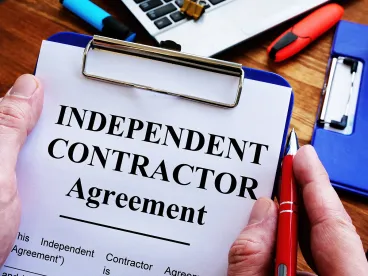On July 8, 2021, Governor Murphy signed four bills regarding worker misclassification, increasing penalties and enforcement against businesses that misclassify workers as independent contractors. These laws amend and expand upon the worker misclassification laws previously enacted in January 2020, which we addressed in our prior alert (the “January 2020 Laws”). The January 2020 Laws enhanced liability for managers, making them jointly and severally liable for wage violations, and made posting violations and retaliation for misclassification complaints a disorderly persons offense. Further, these laws created new administrative requirements, permitted “stop-work orders,” provided back pay to improperly classified workers of up to 5% of their prior year’s gross earnings, and increased fines to $250 per employee for a first violation and up to $1,000 per employee for subsequent violations involving worker misclassification (and notably this is aside from any potential penalties for failing to properly withhold payroll taxes). However, given the pandemic, enforcement of the January 2020 Laws largely stalled. Collectively, the prior and current laws demonstrate New Jersey’s renewed focus and expansion of resources, enforcement powers, and penalties to support the State’s efforts to curb misclassification of workers. Indeed, the State’s focus on proper worker classification of employees is not surprising as such measures generate much needed revenue in the form of payroll taxes.
Who is an “Employee” in New Jersey?
Under the “ABC Test” codified in New Jersey’s Unemployment Compensation Law, workers are properly classified as “employees” if each prong of the below test is met. However, the ABC Test is narrowly applied and workers are generally presumed to be employees unless the employer can establish all three prongs.
-
The individual has been, and will continue to be, free from control or direction over the performance of such service, both under her/his contract of service and in fact; and
-
Such service is either outside the usual course of the business for which such service is performed, or that such service is performed outside of all the places of business of the enterprise for which such service is performed; and
-
Such individual is customarily engaged in an independently established trade, occupation, profession or business.
Highlights of the Newest New Jersey Worker Misclassification Bills
Effective immediately, Assembly Bill No. 5891 established the Office of Strategic Enforcement and Compliance to oversee enforcement of New Jersey’s wage, benefit and tax laws. The bill appropriated $1,000,000 toward this effort. If a business is seeking direct business assistance from the State, that business must be in good standing, meaning that it cannot owe any outstanding monies for unemployment or disability contributions, or a final order for the payment of wages.
Assembly Bill No. 5892, effective January 1, 2022, streamlines the identification of employee misclassification. It essentially treats employee misclassification as potential insurance fraud. In relevant part, the bill provides that any “person, organization or business” that “purposefully or knowingly” misclassifies its workers for the purpose of evading the full payment of employee related insurance benefits or premiums violates the New Jersey Insurance Fraud Prevention Act.
The Commissioner of Labor and Workforce Development (the “Commissioner”) is authorized to seek penalties in a civil action as well to levy civil and administrative penalties as restitution to an insurance company or person who experienced a loss as a result of a violation of the act as follows:
-
Not more than $5,000 for the first violation
-
Not more than $10,000 for the second violation
-
Not more than $15,000 for each subsequent violation
In addition, the Commissioner may request that the Office of the Insurance Fraud Prosecutor consider bringing criminal charges against violators. Although the act does not prohibit those alleged to be guilty of violating the act from entering into a settlement with the payment of a civil penalty, licensing authorities may still seek administrative action, even in the presence of a consent agreement.
Assembly Bill No. 5890, which also immediately went into effect on July 8, 2021, addresses enforcement of worker misclassification and stop-work orders. Under this act, the Commissioner may issue stop-work orders on its initial determination or following an audit that reveals a violation of New Jersey wage, benefit or tax law. These orders grant broad authority to stop work across the business’ worksites and places of business, not just at the location at which violations were found. Workers are entitled to pay for the first ten days of lost work due to a final stop work order.
Failure to cooperate with the Commissioner’s investigations, as well as the act in general, has serious ramifications. Failure to provide information requested in the Commissioner’s subpoena or impeding the investigation may result in a $1,000 per day fine and is considered a disorderly persons offense. Hindering or delaying the act’s enforcement, failing to preserve required records, falsifying records or refusing to make records available or to provide any requested information as well as failure to pay proper wages under this act also may result in jail time between 10 and 90 days.
Finally, Assembly Bill No. 1171 establishes a publicly accessible database of certified payroll information for public works projects. This database includes contractor and subcontractor bids in which withholding information for employees must be provided.
Key Takeaways
Independent contractor (or consultant) agreements should not be relied on to establish contractor status, and are generally only indicative of the parties’ intent. In addition to the penalties associated with these laws, we expect there to be significant penalties for unpaid (and un-withheld) payroll taxes, from both state and federal taxing authorities. As such, we urge New Jersey employers to review worker classification status now to ensure that workers are properly classified and to implement any necessary conversions to employee status. It is best to implement any such changes proactively and in advance of an enforcement action.




 />i
/>i

